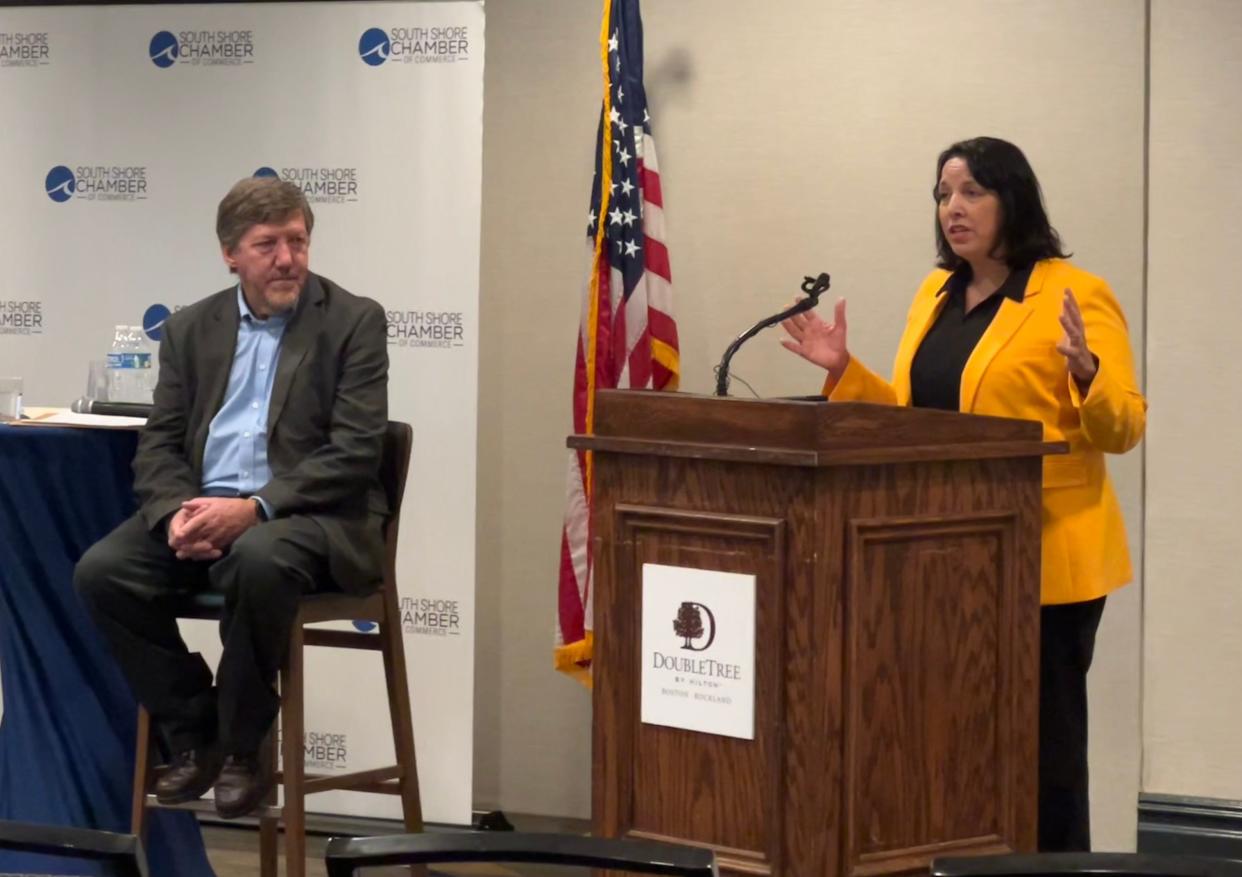Could a state housing initiative negate a South Shore city's zoning efforts?

- Oops!Something went wrong.Please try again later.
Single-family homeowners in Massachusetts may be allowed to build an accessory dwelling unit on their property without a special permit if an affordable housing package proposed by Gov. Maura Healey’s administration passes in the upcoming legislative session.
But will this render Weymouth’s attempt to regulate in-law apartments obsolete? It may be too soon to tell, the mayor said.
“Right now, we’re looking at it as two separate things,” Mayor Robert Hedlund said. “We don’t really know what the particulars are, what the guidelines will be or the regulations. It’s hard to pair them up together and see what kind of differences are there.”
What's the difference between accessory dwelling units and in-law apartments?
Some municipalities use the terms "accessory dwelling units" and "in-law apartments" interchangeably. They both offer secondary living quarters on the same lot of the main home. But Weymouth's proposed guidelines for in-law apartments are slightly more restrictive than accessory dwelling units.
As part of the governor’s $4.1 billion bond bill unveiled in October – which includes $1.6 billion to improve 43,000 public housing units and $800 million for the Affordable Housing Trust Fund – a proposal seeks to make accessory dwelling units allowable by right for single-family homes.
It would make mom happy: Can you Lend a Hand to your South Shore neighbors in need?
This means that while plans for the structure still must be submitted to the municipality and codes must be met, it does not need a special permit or zoning approval that other developments may be subject to.
According to the bill, the unit can’t be more than 900 square feet, or half the size of the main home’s square footage, whichever is smaller. It also must have a separate entrance from the outside or through a shared corridor with the main home. At least one parking space would be required, but there would be no additional parking requirement for such a unit within half a mile of public transportation.
Municipalities may apply more restrictions to accessory dwelling units, such as smaller maximum square footage or banning short-term rentals like Airbnb. But these units are allowed to be used as long-term rentals.
Weymouth's proposal for restricting in-law apartments
Weymouth’s draft proposal for its in-law apartment rules would limit the structure to two bedrooms, one bathroom and one efficiency-style kitchen, which refers to a removable kitchen with appliances that don’t require more than 120 volts to be powered. It cannot be bigger than 600 square feet, which is down from 800 square feet in a previous draft of the language. No more than two people can live there, with the exception of in-home medical professionals.
The apartment can be within the footprint of the main home or built as an addition, but the two must have a shared living area. Also, the entrance to the in-law apartment has to be through the main home and at least one off-street parking space must be provided. The property owner would have to file paperwork with the Norfolk County Registry of Deeds or Land Court that would prohibit the rental of the apartment once the home is sold.
Last, and perhaps most important, the person living in the in-law apartment must be related to the owner of the main home either by blood or marriage. The intent, town officials say, is to ensure that the apartment doesn’t become a form of income for the property owner where anyone could rent it.
"The (apartment) is to provide temporary residential living for persons who are related to the owner of the existing single-family dwelling either by blood or marriage," the proposed language reads, adding that it "does not turn the property into a two-family dwelling that can be rented to anyone."
This, along with the governor’s proposal, led some town council members to question the need for the town’s in-law rules at all.
Why is Weymouth creating in-law apartment rules?
Weymouth started looking at crafting in-law apartment language after receiving a petition from residents who were concerned about an in-law apartment being built larger than the main home in their neighborhood, Hedlund said. Rumors started circulating that it would become a sober home. This type of use, along with group homes and day cares, are allowed anywhere regardless of zoning, said Robert Luongo, Weymouth’s planning director.
Hedlund said he confirmed with the property owner that it would be used as an in-law apartment, as proposed.
The town then realized it did not have specific language regulating how big these structures can be or how many people can live in them, and that the previous building inspector had interpreted the town’s zoning language to allow in-law apartments by right, Luongo said.
As the town worked on writing these rules, it put a moratorium on building applications for in-law apartments.
But the details have led to some back-and-forth between town council members and staff.
Holiday happenings: 32 holiday markets on the South Shore: Crafts, baked goods and Santa, oh my
During an ordinance review committee meeting Nov. 1, District 5 Town Councilor Gary MacDougall said that if accessory dwelling units by right passed in Massachusetts, it would “negate all this and it’s going to throw it out the window.”
Luongo disagreed, saying that by-right provision might not pass and that some people might prefer to build in-law apartments over accessory dwelling units. He also warned that if in-law apartment language isn’t approved, no more of these structures could be built in Weymouth.
Accessory dwelling units by right are “going to, in my opinion, decimate the (single-family home) neighborhoods in this state, and that is not the way to solve the affordable housing crisis by creating more congestion in your residential neighborhoods,” Luongo said. “That’s a very dangerous piece of legislation.”
There are different types of families
MacDougall also took issue with the familial relation requirement, saying there are different types of families in which people aren’t necessarily related in this way.
“I think this is, a little, putting people in an odd position to sign something that they’re going to lie about because they’re trying to help a friend,” MacDougall said.
Luongo said the town would have no method of confirming the familial relation of the person occupying the in-law apartment.
“We’re not going to be checking on it,” Luongo said. “By saying anyone can move into it, you’re encouraging it.”
A resident’s proposal that doesn’t meet all of the in-law apartment requirements could still be approved. It would just require a special permit.
The ordinance review committee continued a vote on the language until Nov. 27.
How the state thinks accessory dwelling units help with affordability
Developing ways to create more affordable housing is at the center of the governor’s recent proposal, whether that’s done by policy or money.
South Shore municipal leaders had the opportunity to discuss the legislation more in depth with Lt. Gov. Kim Driscoll and Housing and Livable Communities Secretary Ed Augustus at a recent panel hosted by the South Shore Economic Development Corp. and the South Shore Chamber in Rockland.
“One of our biggest obstacles in Massachusetts has not necessarily always been the ‘how’: ‘How do you do it? Where would you put the housing? What's the right place?’ It’s the desire to do it. It’s the ‘why,’ and sometimes the ‘why not,’” Driscoll said. “Communities are usually more likely to say ‘no’ than to say ‘yeah, but.’ ‘Yeah, but let’s fix the roads. Yeah, let’s make the infrastructure work. Yeah, let’s make sure it’s got some affordability in it.’”
Driscoll said accessory dwelling units by right is the "simplest" way to increase the number of living spaces and offer affordable housing. The state estimates that allowing this could add more than 8,000 units over five years.

Hedlund brought up his concerns with the accessory dwelling unit proposal and how it would affect Weymouth, potentially turning single-family homes into two-family lots.
“The problem we have is we’ve got a lot of small lots and a very densely populated community,” he said. “That’s something we’re going to be watching closely in terms of what local control that it takes away from us.”
Augustus responded that accessory dwelling units wouldn’t work everywhere.
“There are some common-sense things that are going to prohibit some folks from doing this. One is just the physical space,” he said. “But you’re also going to have a situation where not everybody is going to be able to afford to do this.”
More: Weymouth's Red Rose Irish Pub is under new ownership. Here's what they're planning
In Salem, where Driscoll was formerly mayor, accessory dwelling units are allowed by right. Residents can apply for construction grants and an ordinance limits how much rent can be charged.
“It has not overrun neighborhoods,” Driscoll said of the units. “It’s not the worst thing in the world that can happen.”
Hedlund said while the possibility of being preempted can be frustrating, he was glad to hear that the state doesn’t view accessory dwelling units in a one-size-fits-all approach.
“As long as there are some protections in areas where it wouldn’t really fit in with the characteristics of the neighborhood, it can work in some areas,” he said.
Hannah Morse covers growth and development for The Patriot Ledger. Contact her at hmorse@patriotledger.com.
This article originally appeared on The Patriot Ledger: Weymouth proposed in-law apartment rules could be negated by state law

